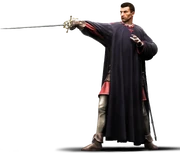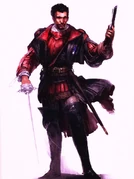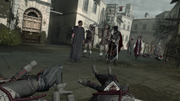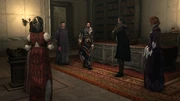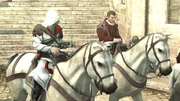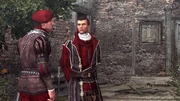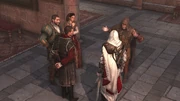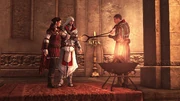テンプレート:WPBrotherhood
- "ニッコロ・ディ・ベルナルド・デイ・マキャヴェリ、アサシンです。人類の進歩を見守るため厳しい修行を積んだ、仲間ですよ。貴方や他の面々の"
- ―エツィオに初めて会ったとき[src]
' ニッコロ・マキャヴェリ(Niccolò di Bernardo dei Machiavelli) (1469 – 1527)はイタリアの哲学者で作家であり、アサシンである。現代の政治学の創始者の一人であるといわれ、彼は外交官、政治哲学者、音楽家、劇作家であり、フィレンツェ共和国の公務員であった。
教団ではエツィオに協力しフォルリでオルシ兄弟を倒し、フィレンツェからエデンのリンゴの力を使い権力を得た修道士ジローラモ・サヴォナローラを排除した。
二年後 マキャベリは前リーダーマリオ・アウディトーレの死後、イタリアのアサシンの実質的リーダーとなり、エツィオと腐敗したボルジア家に支配されていたローマを解放するために戦った。 彼の目的は、エツィオレオナルド・ダ・ヴィンチと共にチェーザレ・ボルジアを追いかけバレンシアナヴァラで果たされた。
それからの彼はフィレンツェ政府で働き、市民兵の訓練を行った。しかし、1512年スペイン軍に侵攻されえたとき逮捕され追放された。
生涯[]
初期[]
1469年05月03日 ニッコロはフィレンツェの法律家の父ベルナルド・ディ・ニッコロ・マキャヴェッリとその妻バルトロメーア・ディ・ステファノ・ネリの3人目の子で初めての息子として生まれた。
早い時期から訓練を積み、アサシンへ入団していた・[1]
エデンのリンゴを手に入れる[]
- "預言者が現れるのは決まっていたこと。そしてここへ現れたのは貴方だ。貴方こそ我々が探し求めたいたものです。"
- ―マキャヴェリがエツィオに[src]
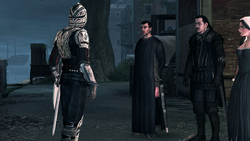
Machiavelli explains the Order to Ezio.
19歳の頃 テンプル騎士団の総長ロドリゴ・ボルジアからエデンのリンゴを取り戻すため、ヴェネツィアに集まったアサシン教団メンバーの中に居た。彼らがロドリゴの居場所へたどり着いたとき、エツィオがロドリゴと戦っているのを発見した。他のメンバーはすかさずエツィオに加勢するところをマキャヴェリは遠くで見守っていた。番兵を倒しロドリゴが傷を負い逃げ出したあと、マキャヴェリは自分やエツィオに力を貸した者たちがアサシンであったと紹介する。日没後、彼らはヴェネツィアの塔の上でエツィオを教団に迎え入れ、そこからイーグルダイブを行った。
ちなみに19とは思えんほどの老けっぷりだった。[1]
フォルリの戦い[]
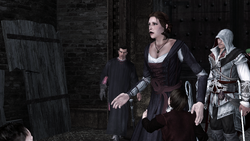
Niccolò, Ezio and Caterina after having entered the citadel.
エツィオの入団の後、マキャヴェリはエツィオに同行しテンプル騎士団の手からリンゴを守るため協力者カテリーナ・スフォルツァの治めるフォルリに向かった。
フォルリに到着したとき彼らはオルシ兄弟によって城が包囲されているのを発見し、ロッカ・ディ・ラヴァルディーノへの道を開くため街で戦った。
そこに到着すると同時に増援に襲われる、その攻撃を凌いだ後エツィオはカテリーナにリンゴを託し子供たちを救出に向かう。
エツィオがロッカ・ディ・ラヴァルディーノに戻るとマキャヴェリはリンゴが奪われたことを伝え、それを取り戻すためにチェッコ・オルシを追わせた。リンゴを取り戻したもののエツィオは瀕死の重傷を負いリンゴはジローラモ・サヴォナローラによって奪われた。[2]
虚栄のかがり火[]
- "長いものには巻かれろ、というわけですよ。私達が目を覚まさせてやっらなければ。"
- ―サヴォナローラに操られる人々について[src]
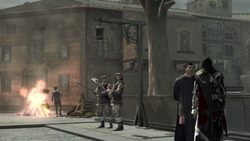
Niccolò and Ezio discussing Savonarola.
1497年 マキャヴェリはフィレンツェでエツィオに再開しジローラモ・サヴォナローラがリンゴを手に入れ街を支配していると伝える。エツィオはサヴォナローラの9人の腹心を殺せば彼の求心力は低下すると考えた。マキャヴェリはこの作戦をパオラと狐に伝え、すべての腹心を暗殺した後市民たちに立ち上がるように促した。
反乱に燃える怒れる暴徒達は、サボナローラの居るピッティ宮に群がった。サヴォナローラはそれをリンゴの力で抑えようとするがエツィオはナイフを投げ、その手からリンゴを落させた。エツィオはそれを拾おうとするが、ボルジアの手の者に回収された。
その後、サヴォナローラは火刑に処されるのアサシン達が見ていが、エツィオは誰にでも安らかに死ぬ権利はあると思いサヴォナローラが炎にまかれる前にとどめを刺した。そして、エツィオは自分で道決め歩めという演説で民衆を鼓舞しアサシン達はその場をあとにした。
After Ezio gave a speech to inspire the crowd to follow their own ways, the Assassins left the scene.[3]
ローマの戦い[]
- マキャヴェリ: "いつかあなたの本を書くつもりです。"
- エツィオ: "書くなら短めにな。"
- ―エツィオが大導師になった後[src]
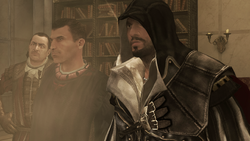
Machiavelli and Ezio discuss the locations indicated by the Apple.
1499年 マキャヴェリ、エツィオ、マリオ、バルトロメオ、狐、アントニオ、パオラ、テオドラのイタリアアサシン首脳陣が宝物庫についての話のためモンテリジョーニヴィラに集まった。
そこでの話は、ローマヴァチカンに存在する宝物庫の鍵はリンゴと杖の2つのエデンの果実が必要でありそれに近づくためロドリゴは教皇の地位に着いた、と結論に至った[1]
マキャヴェリ後でエツィオに宝物庫で見たものを聞くためにモンテリジョーニに戻ってきた。そこでロドリゴにとどめを刺さなかったことを聞き、怒りロドリゴの首を取るため即座にローマへ向かい飛び出していった。
翌朝、モンテリジョーニはロドリゴの息子チェーザレにより攻撃を受けた。マキャヴェリが居なくなったことにより狐は彼がボルジアのスパイであるという疑念を抱いた。攻撃により死亡したマリオの代わりにローマテベル島で指導者不在の教団の指揮をとった。
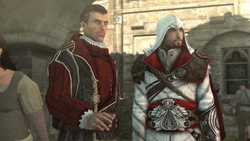
Niccolò informing Ezio about the closed shops.
攻撃の後、エツィオもローマに発つがそこで受けた二発の銃創のせいで道に倒れた。それをマキャヴェリがローマの郊外へ住む女性へ手当を行うよう預け、目が覚めたらアウグストゥス霊廟で待っていると伝言を頼んだ。
エツィオが来るとマキャヴェリはローマの腐敗を教え、装備を整えるための金を渡した。 そして、ボルジアの協力者と思われるロムルス教団を教え、街を流れる下水道を通じ高速で移動できることを教えた。
地下道を使い戻ったアジトでアサシンの協力者ファビオ・オルシーニと出会う。
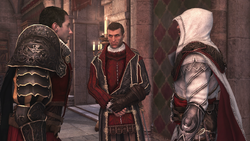
Niccolò speaking with Ezio and Fabio Orsini.
エツィオが地下勢力の立て直しに出発したあと、ローマの市民を脅迫していたテンプル騎士団員の名前を得るために彼らに接触していた。エツィオは地下勢力とアサシンの関係を強化しカテリーナ・スフォルツァを救出の後、新たな仲間を教団に加えるためマキャヴェリのところへ戻った。その計画にニッコロは懐疑的ではあったが認め、鳩小屋を経由して弟子と連絡をとる手段を構築する。
1503年 狐はニッコロがボルジアの手先であるという証拠は揃ったと信じていたため「なすべきことをせねばならん」と言うが、エツィオはマキャベリが裏切り者だとは考えなかったので彼を殺しはしなかった。
その代わり狐自身がマキャヴェリを殺すためテベレ島へ向かった。しかし、本当の裏切り者は狐の配下の盗賊であったことが分か狐をマキャヴェリが殺されかけた瞬間エツィオがそれを知らせマキャヴェリの命は救われた。そして狐は何もなかったように振る舞いマキャヴェリとの関係を修復した。
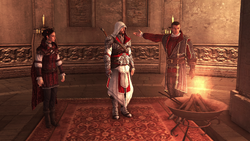
Niccolò promoting Ezio to head of the Assassin Order.
3年後の1506年 マキャヴェリはボルジアとの戦いとローマ解放の功績から、エツィオのほうがアサシンよ率いるにふさわしいと考えた。 そして、エツィオの妹クラウディアがアサシンの入団儀式を済ませたあと、エツィオにアサシンの長の役割を与えた。
急な心変わりをエツィオが尋ねたとき、マキャヴェリは常にそばに居たとローマに運んだのも、サンタ・アンジェロ城の爆発も、コロッセオで加勢に来た傭兵も自分の行為だと語り、エツィオは彼に相談役を頼んだ。"[4]
チェーザレとミケロット[]
- "我々はミケロット・ダ・コレーリア貴方を囚人として連行します。これ異常貴方が我々の国を汚さないよう。"
- ―Machiavelli arresting Micheletto after the attack on Zagarolo.[src]
After the death of Rodrigo Borgia at the hands of Cesare, the latter was soon imprisoned by the new pope in the Castel Sant'Angelo. After a failed escape attempt, he was transferred to a different prison, and the pope would not even reveal its location to Ezio.
Thus Ezio and Machiavelli started their quest to find Cesare, speaking to Giulia Farnese, Charlotte d'Albret, and Vannozza dei Cattanei. These conversations didn't provide them with the information they needed, and on their way back they were confronted by one of Machiavelli's spies, Bruno. He told them of Claudia's capture and imprisonment by the Borgia diehards, and Ezio and Machiavelli went to the assigned building to free her.
After a short but fierce fight, the diehard leader revealed that they worked for Micheletto Corella, after which the Assassins decided to look for him, as he could lead them to Cesare. They soon found him in Zagarolo, where he had mustered a force of 200 men. The Assassins marched there the following day, with an army of 100 Apprentices and thieves, and were able to arrest Micheletto, who was then brought to Florence to be interrogated by Machiavelli, Piero Soderini and Amerigo Vespucci.
A few days after the interrogation, on the day of Micheletto's execution, he managed to escape, and Machiavelli brought Ezio this grave news. They decided to track Micheletto and follow him to Cesare, using the Apple to find him. The Apple told Ezio to ride for Naples, and the Assassins did so immediately. Once they arrived in Naples, the encountered the courtesan Camilla, who told them that Micheletto had traveled to Valencia.[5]
Chasing Micheletto[]
- "Well, we don't need the Apple to tell us what our old friend Cesare is planning."
- ―Niccolò, upon arriving in Valencia.[src]
Once they arrived in Valencia, they immediately noticed the ship Micheletto had used to travel there. They asked the captain where his passenger was heading, and he told them to look for Micheletto in the Lone Wolf inn. They managed to find the building without difficulty, but were ambushed as they entered its dark interior. There was a fierce battle, and Ezio eventually recognized one of their ambushers as Micheletto himself.
However, Micheletto and his diehards fled the scene before the Assassins could follow them, though one of the diehards revealed that they were going to the Castillo de la Mota, where Cesare was imprisoned. The Assassins chased Micheletto, but he had stolen a march on them and had managed to break Cesare out of prison before they arrived. When the Assassins heard this news, Ezio wanted to return to Valencia immediately, acting on a vision he had seen using the Apple, but Machiavelli insisted on resting.
They returned to Valencia within the month but found that Cesare had managed to build up a considerable army. There were more than one thousand men stationed just outside Valencia, and there was a fleet of a dozen warships in its harbor.[5]
Attack on Valencia[]
Ezio and Niccolò formulated a plan to destroy Cesare's new army. Whilst Niccolò made his way to the diehards' camp, Ezio headed to the docks to destroy the enemy ships there with several hand-held bombs.
Afterwards, he met up with Niccolò on the corner of the street where the Lone Wolf Inn was located. The two climbed onto the roof of the building, and peered through the open top skylight at Cesare and Micheletto, who were discussing the recent turn of events.
Cesare angrily belittled Micheletto, blaming him for what had happened and driving him to launch himself across the table at his Master. Cesare quickly pulled one of his pistols from his belt and shot Micheletto, destroying his face completely.
Ezio pulled back, hoping to catch Cesare as he left the building, though Niccolò, who had craned forward to get a better look, had kicked a tile in the process, drawing Cesare's attention. Drawing his second pistol just as rapidly as he had his first, Cesare shot at the Assassin, hitting Niccolò in the shoulder.
Ezio briefly thought of pursuit, but Niccolò's injury was severe and required immediate medical attention. Finding a local doctor, they learned that the bullet had gone straight through, and that Niccolò would be sufficiently healed for travel in two weeks. Before Ezio left to pursue Cesare, Niccolò wished him good luck.[5]
Florentine militia[]
Between 1503 and 1506, Niccolò returned to Florence, where he was responsible for leading the Florentine militia. Strangely, he noted on multiple occasions that he distrusted mercenaries,[6] despite leading the Florentine mercenaries himself.[1]
His militia managed to defeat Pisa in 1509. However, in August 1512, they were defeated by the Medici, aided by Spanish troops and Pope Julius II. After this, Florence was dissolved as a city-state.
Niccolò was deprived of office in 1512, and was arrested in 1513 on accusations of conspiracy. He was tortured in prison, though he denied involvement in any conspiracy. He was released, and he retired to his estate in Sant'Andrea in Percussina.[6]
Later life[]
During his stay at his estate, Niccolò wrote Il Principe (The Prince), which was a relatively short book written in a few months. It was written specifically for a period when the Medici family had the opportunity to build a strong Italian state in central Italy, and drive out the "barbarians."
Over a significant amount of his life, Niccolò also wrote the Discourses of Livy, a thesis that reflected his more republican notions of government. It is a far more comprehensive thesis than The Prince.
These two manuscripts were banned by the Church because they were in direct opposition to many of Niccolò's reforms, as he sought to help unite the city-states of Italy under government, not religion. Together the Discourses and The Prince explained that Niccolò was an individual who preferred a republican government, but was prepared to accept a principality if it ensured the survival of the state.
There have also been suggestions that The Prince is a piece of overt political satire. This is inspired in part by the fact that his magnum opus, the Discourses, contains arguments that clash with the contents of The Prince.
Particularly interesting was the fact that it was written in Italian rather than Latin, as was the common practice by Italy's intelligentsia at the time. This suggests that the book was actually written to be digested by Italy's common people rather than the ruling classes (who were likely already aware of the techniques described within the book).[6]
By 1524, Machiavelli had also become a successful playwright; Ezio intended to see one of his plays but missed it by three weeks. When the Chinese Emperor Jiajing's soldiers began pursuing Ezio's guest Shao Jun, the Mentor had his wife Sofia and their two children stay at Machiavelli's estate.[7]
Niccolò died on 21 June 1527 at the age of 58. His final resting place is the Basilica di Santa Croce in Florence.[6]
Characteristics and personality[]
- "When did you become so cynical?"
- ―Ezio Auditore to Niccolò.[src]
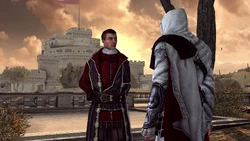
Niccolò speaking to Ezio in Rome.
Niccolò possessed a rather intricate personality. He was a mysterious individual, secretive in his ways, which resulted in his fellow Assassin, La Volpe, questioning his loyalty to the Assassin Order.
A usually cautious man, Niccolò was often astounded by Ezio Auditore's brash and headstrong actions. He was also opportunistic, easily seeing the actions which benefited the Order the most. This was clearly shown when Ezio infiltrated the Castel Sant'Angelo for the first time, and Niccolò insisted that Ezio prioritize assassinating the Templars Cesare and Rodrigo, rather than rescuing Ezio's lover Caterina Sforza.
Niccolò also, from time to time, verbally sparred with Ezio, usually openly contradicting his views. When Ezio suggested that the Order appeal to the citizens of Rome for aid, Niccolò quickly opposed this idea, stating that relying on the people was "like building on the sand."
Niccolò often had little patience for those who did not follow his plans, and was quick to do things on his own should he see fit. He rarely worked alongside Ezio or other Assassins, preferring to do everything his own way so long as it ended in a beneficial result for the Order (such as making deals with Borgia guards, an act which other Assassins would see as conspiring with the enemy).
He could sometimes be seen to display a dry, almost uncaring sense of humour. While rarely laughing, he would often make sarcastic quips, particularly to Ezio. He also found it amusing to laugh at Ezio's misfortune when his money was stolen by a thief, partly because it supported a pessimistic point of his that trusting the citizens was a waste of time, shortly after debating it with Ezio.
While not as brash or flamboyant in his fighting style as Ezio, Niccolò was nonetheless a skilled fighter and swordsman. Although never assassinating targets, he usually carried a blade with him for both defensive and offensive means. In various different battles with Ezio, he is seen being capable of performing the same killing techniques as him, as opposed to the dogmatic style of simply swinging his sword at the enemy.[4]
Trivia[]
- In line with his real-life counterpart, the in-game Niccolò stated during the Bonfire of the Vanities that he found mercenaries unreliable, as they fought only for payment, not loyalty.
- However, in Assassin's Creed: Brotherhood, Niccolò openly admitted to Ezio that the mercenaries that aided him in the Colosseo were sent by him.
- Despite being only 19 when he first met Ezio Auditore, Niccolò acted very mature towards his elder Assassin.
- The clothes Niccolò wore in Assassin's Creed II and at the beginning of Brotherhood were based on the real-life clothes he could be seen wearing in various pieces of artwork and statues built of him.
- If Ezio chose to do nothing during the moment where Savonarola tried to silence the crowd in the Bonfire of the Vanities, Niccolò would step in and be the one to throw a knife at Savonarola's hand.
- Niccolò threw the knife in Assassin's Creed: Renaissance as well.
- Historically, Niccolò had good relations with the Borgia family. In 1502, he was sent on a diplomatic mission to Cesare Borgia. He called Rodrigo Borgia a very successful politician, because he was the prototype of a leader who had no scruples to reach his target, and historically, it is also said that Niccolò greatly admired Cesare Borgia. For obvious reasons this isn't the case in the game, but Machiavelli does mention that Cesare Borgia is a capable leader.
- In Brotherhood, it was suggested that Niccolò's later works, mainly The Prince, were inspired by Ezio.
Gallery[]
Art[]
Screenshots[]
References[]
- ↑ 1.0 1.1 1.2 1.3 Assassin's Creed II
- ↑ Assassin's Creed II - フォルリの戦い(DLC)
- ↑ Assassin's Creed II - 虚栄のかがり火(DLC)
- ↑ 4.0 4.1 Assassin's Creed: Brotherhood
- ↑ 5.0 5.1 5.2 Assassin's Creed: Brotherhood novel
- ↑ 6.0 6.1 6.2 6.3 Wikipedia: Niccolò Machiavelli
- ↑ Assassin's Creed: Embers
| |||||||||||||||||||||||||||||||
| |||||||||||||||||||||||||||||||

